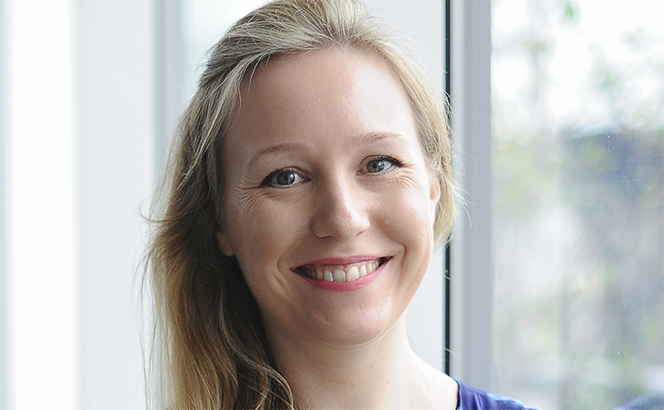Research from the Bridge Group found that among ten leading City law firms 53% of partners attended independent schools and that those from lower socio-economic backgrounds took a year and a half longer on average to make partner. In addition, Covid-19 has revealed and compounded existing inequalities in wealth, race, gender, age, education and geographical location.
Three Travers Smith partners reflect on their experiences of social mobility and offer advice to aspiring solicitors.
Polly Richard, dispute resolution (pictured above):
I’m the first generation in my family to go to university, received free school meals and went to a northern comprehensive school. I was blissfully unaware of the perceptions that would be drawn about my social background, quality of education and level of intellect simply by being northern, until I went to the University of Durham and a fellow student said to me on the first night: ‘oh my gosh, I’ve never spoken to a northern person’. Ironic, given we were in Durham.
My background has made me feel excluded and under-confident in some contexts, mainly due to a lack of shared experiences and interests. This initially impacted my aspirations and I never imagined I’d be a partner at a law firm. However, early in my career a supervisor at Travers helped me view my background, my difference, as my strength. In my first appraisal he set my objective as ‘be you!’ I soon realised that having a posh accent doesn’t make you a better lawyer and after some mentoring and positive appraisals, realised I was good enough. Twelve years on I no longer see my difference as my weakness but as my superpower!
You cannot underestimate the importance of socio-economic diversity in law firms – first and foremost a law firm is only as good as its people. It’s in everyone’s interests that the best people – those defined by their own merits – are recruited and retained. Secondly, our clients are best served by a diverse set of lawyers who think differently and have different experiences. Thirdly, diversity makes for a more inclusive and fulfilling working environment and keeps the workplace interesting!
Madeline Gowlett, tax:

I went to my local comprehensive. I ate my evening meals off plastic plates in front of the TV, didn’t go to restaurants and my family holidays were camping. I didn’t consider myself disadvantaged, just normal! It was only when I went to Cambridge and was nicknamed ‘quota’ and ‘access’ that I realised not everybody saw it that way.
I care about social mobility partly because I nearly missed out on a career in law. If Travers hadn’t given me a training contract and paid for my law conversion and LPC fees, I would have done something completely different.
My view is that historically law firms assessed applicant’s grades without considering socio-economic hurdles, and there was an over-focus on polish. We need to focus on performance – and potential – ahead of polish. There are many clever, motivated people who would make great lawyers who come from social mobility cold spots and law firms need to do more to find them.
Things are definitely improving. As a firm we’ve adopted a Contextualised Recruitment System that takes into account socio-economic background and reviews applications in light of a candidate’s wider personal circumstances. Finally, as more people from lower socio-economic groups establish themselves within law, this provides role models and hopefully changes expectations around how ‘a good lawyer’ looks, sounds and thinks. If you need more inspiration, the Law Society’s social mobility ambassadors showcases some amazing lawyers from non-traditional backgrounds.
Peter Hughes, finance group:

Like Polly, I was the first generation in my family to go to university. In my experience, people generally like people who are most like themselves. If senior people are from privileged backgrounds, then unconsciously they might bias those who are more privileged. Perhaps they went to the same school or play similar sports – these shared experiences allow them to bond and break down barriers.
What can we collectively do to help this? We should celebrate our differences, showcase diverse role models, and provide platforms for senior leaders from less privileged backgrounds to share their own stories. Allies have a really important role. In a similar vein to men championing gender equality, straight people promoting LGBT+ inclusion, and white people helping tackle racial inequality, it’s essential that people from more privileged backgrounds help tackle social mobility related barriers.
So to all those aspiring solicitors from lower socio-economic backgrounds, I would say now is a good time to be starting a legal career. Barriers related to socio-economic background are coming down and things are moving in the right direction. The City of London Corporation has set up the Task Force to Boost the Socio-Economic Diversity at Senior Levels in UK Financial and Professional Services – the way the legal profession deals with socio-economic differences is right in the spotlight.
There are also fantastic organisations supporting young people with career advice, networking opportunities and contact with potential employers. Aspiring Solicitors and GROW Mentoring both aim to help people from lower socio-economic backgrounds achieve success in their legal careers.
And finally, all top law firms now work with organisations like Rare Recruitment, which opens the talent pool and provides access to exceptional graduates they might otherwise miss.
Law as a profession should be open to everybody.











